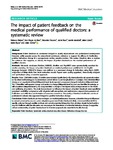The impact of patient feedback on the medical performance of qualified doctors: a systematic review
| dc.contributor.author | Baines, Rebecca | |
| dc.contributor.author | de Bere, SR | |
| dc.contributor.author | Stevens, Sebastian | |
| dc.contributor.author | Read, J | |
| dc.contributor.author | Marshall, M | |
| dc.contributor.author | Lalani, M | |
| dc.contributor.author | Bryce, Marie | |
| dc.contributor.author | Archer, Julian | |
| dc.date.accessioned | 2018-09-10T08:30:02Z | |
| dc.date.issued | 2018-07-31 | |
| dc.identifier.issn | 1472-6920 | |
| dc.identifier.issn | 1472-6920 | |
| dc.identifier.other | ARTN 173 | |
| dc.identifier.uri | http://hdl.handle.net/10026.1/12266 | |
| dc.description.abstract |
BACKGROUND: Patient feedback is considered integral to quality improvement and professional development. However, while popular across the educational continuum, evidence to support its efficacy in facilitating positive behaviour change in a postgraduate setting remains unclear. This review therefore aims to explore the evidence that supports, or refutes, the impact of patient feedback on the medical performance of qualified doctors. METHODS: Electronic databases PubMed, EMBASE, Medline and PsycINFO were systematically searched for studies assessing the impact of patient feedback on medical performance published in the English language between 2006-2016. Impact was defined as a measured change in behaviour using Barr's (2000) adaptation of Kirkpatrick's four level evaluation model. Papers were quality appraised, thematically analysed and synthesised using a narrative approach. RESULTS: From 1,269 initial studies, 20 articles were included (qualitative (n=8); observational (n=6); systematic review (n=3); mixed methodology (n=1); randomised control trial (n=1); and longitudinal (n=1) design). One article identified change at an organisational level (Kirkpatrick level 4); six reported a measured change in behaviour (Kirkpatrick level 3b); 12 identified self-reported change or intention to change (Kirkpatrick level 3a), and one identified knowledge or skill acquisition (Kirkpatrick level 2). No study identified a change at the highest level, an improvement in the health and wellbeing of patients. The main factors found to influence the impact of patient feedback were: specificity; perceived credibility; congruence with physician self-perceptions and performance expectations; presence of facilitation and reflection; and inclusion of narrative comments. The quality of feedback facilitation and local professional cultures also appeared integral to positive behaviour change. CONCLUSION: Patient feedback can have an impact on medical performance. However, actionable change is influenced by several contextual factors and cannot simply be guaranteed. Patient feedback is likely to be more influential if it is specific, collected through credible methods and contains narrative information. Data obtained should be fed back in a way that facilitates reflective discussion and encourages the formulation of actionable behaviour change. A supportive cultural understanding of patient feedback and its intended purpose is also essential for its effective use. | |
| dc.format.extent | 173- | |
| dc.format.medium | Electronic | |
| dc.language | en | |
| dc.language.iso | en | |
| dc.publisher | BMC | |
| dc.subject | Patient feedback | |
| dc.subject | Systematic review | |
| dc.subject | Medical education | |
| dc.subject | Impact | |
| dc.subject | Behaviour change | |
| dc.subject | Doctors | |
| dc.title | The impact of patient feedback on the medical performance of qualified doctors: a systematic review | |
| dc.type | journal-article | |
| dc.type | Journal Article | |
| dc.type | Review | |
| dc.type | Systematic Review | |
| plymouth.author-url | http://gateway.webofknowledge.com/gateway/Gateway.cgi?GWVersion=2&SrcApp=PARTNER_APP&SrcAuth=LinksAMR&KeyUT=WOS:000440351200001&DestLinkType=FullRecord&DestApp=ALL_WOS&UsrCustomerID=11bb513d99f797142bcfeffcc58ea008 | |
| plymouth.issue | 1 | |
| plymouth.volume | 18 | |
| plymouth.publication-status | Published | |
| plymouth.journal | BMC Medical Education | |
| dc.identifier.doi | 10.1186/s12909-018-1277-0 | |
| plymouth.organisational-group | /Plymouth | |
| plymouth.organisational-group | /Plymouth/Faculty of Health | |
| plymouth.organisational-group | /Plymouth/Faculty of Health/Peninsula Medical School | |
| plymouth.organisational-group | /Plymouth/REF 2021 Researchers by UoA | |
| plymouth.organisational-group | /Plymouth/REF 2021 Researchers by UoA/UoA23 Education | |
| plymouth.organisational-group | /Plymouth/Research Groups | |
| plymouth.organisational-group | /Plymouth/Research Groups/Institute of Health and Community | |
| plymouth.organisational-group | /Plymouth/Users by role | |
| plymouth.organisational-group | /Plymouth/Users by role/Academics | |
| dc.publisher.place | England | |
| dcterms.dateAccepted | 2018-07-11 | |
| dc.rights.embargodate | 2018-9-12 | |
| dc.identifier.eissn | 1472-6920 | |
| dc.rights.embargoperiod | Not known | |
| rioxxterms.version | Version of Record | |
| rioxxterms.versionofrecord | 10.1186/s12909-018-1277-0 | |
| rioxxterms.licenseref.uri | http://www.rioxx.net/licenses/all-rights-reserved | |
| rioxxterms.licenseref.startdate | 2018-07-31 | |
| rioxxterms.type | Journal Article/Review |


